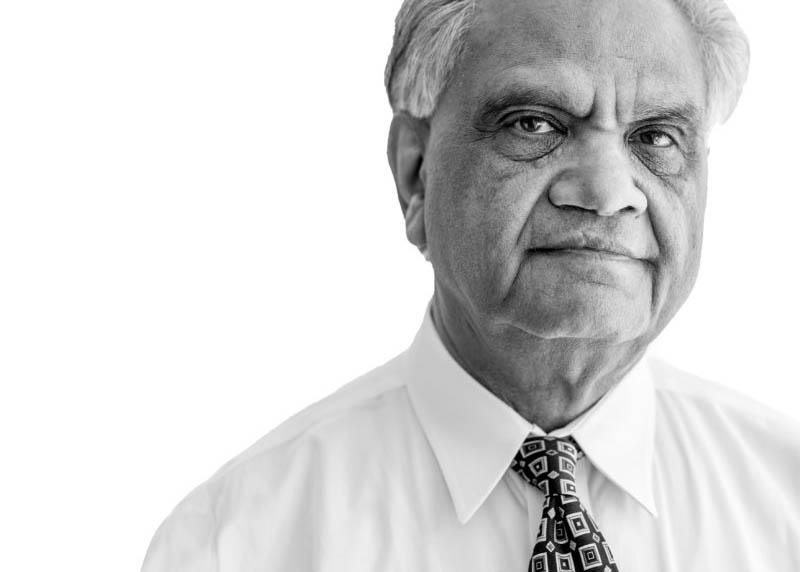 At StrategicCFO360’s recent Strategic CFO Forum, Ram Charan shared his thoughts on what truly creates competitive advantage in the digital age—and what CFOs can do to make sure they are leading the charge.
At StrategicCFO360’s recent Strategic CFO Forum, Ram Charan shared his thoughts on what truly creates competitive advantage in the digital age—and what CFOs can do to make sure they are leading the charge.
Charan has spent the past 35 years working with many top companies, CEOs and boards as a strategic business advisor. He’s authored more than 25 books since 1998 that have sold more than 2 million copies in more than a dozen languages. Three of his books were Wall Street Journal bestsellers including Execution which also spent more than 150 weeks on The New York Times bestseller list.
In his most recent book, Rethinking Competitive Advantage, Charan focuses on what the biggest, most digitally-focused companies do differently—and what you must learn from them to survive in the years ahead.
“Every CFO must suspend the old belief of the last 50 years that you have a sustainable competitive advantage,” he told the CFOs from across the U.S. who gathered virtually for the event. “Start by taking the word sustainable out. It is a competitive advantage a company must earn every day. It is an advantage that you must learn through the eyes of the consumer.
“Observe and measure the consumer’s preference, why the consumer prefers you and not somebody else. What will be the shelf life of this advantage you’re developing? At the end of the day, your advantage is you, the people who know constantly what the consumer prefers.”
What follows are excerpts from our session, edited for length and clarity:
What’s the difference between a true digital leader and those who are lagging when it comes to mindset and the things they do? What are some of the traits of the digital leader?
The focus on the consumer. Be absolutely maniacal. We had 100 years of mass marketing, mass advertising. What has the digital engine enabled? Each customer is unique. It is a market of one. In Amazon they have data about you individually, about me, our individual preferences. Today Starbucks sends 12 million individualized, personalized coupons—every day.
We couldn’t do it before. And that is different. So, your mindset is not focused on the competition. Your mindset is the consumer, getting the consumer with you, understanding with data why the consumer fits for us or why the consumer doesn’t fit for us. That is different.
Put this a little bit in the context of the CFO specifically and growing that digital mindset. What does the CFO need to do? Why in your mind is the CFO so central to all of this?
I believe CFOs are leaders, not just CFOs. They lead the enterprise. They’re leading in the initiatives of the board. So, I want CFOs to be the leaders.
What are they supposed to do? Number one is to get the team together and say, “let’s change the mindset. It’s not too late. It’s actually wonderful because most of our peers don’t have true digital ability yet. We’re going to disrupt this.”
Number two, get a small team, a three-person team: A business person, an algorithm person, and third is the consumer person. Three people. That’s all you need. Full-time, seated near your office. Then say, “Let’s go and map the total end-to-end value chain.” And say, “In this chain, which parts do we do digitization first?”
Third: Search for the outsourcing companies that really can do this job. Altimetrik, Michigan based, they do that for Godiva. USG Global, Fractal in Mumbai, ThoughtLeaders in Chicago. Define what you want. Assign your three-person team. Have a milestone. They’ve got to operate to see it is working. You have data in silos. Get that harmonized. Create a single source of truth and create the dashboards so that you have this weekly, monthly.
Then, do the training inside. Many CFOs believe that the people at the lower levels won’t do it. I urge them to suspend that idea. Your lower-level people are saying, “What took you so long?” They can’t wait to get on with it. So, create training, communicate extensively: “We are moving.”
Go and visit the consumer, see the consumer, become maniacal. Delegate some of your other tasks to the lower-level people. Create the new incentives, new KPIs to do this. You may go slow initially.
One of the CFOs in one of the large companies in India, he got 10 people together. He put them next door to his office. He got all the supplier data in one place. Recoded it, built the platform, and then they began to see the comparison of prices, cycle time, and so on. They cut costs by 35% by doing that, and they generated cash.
What you’ve got to lose is the old rigidity, the old mindset. Reallocate your money and lead the change by getting your team in the next layer involved—because it’s exciting, because it creates more value.
Remember, don’t leave this to the digital people alone. You must have a team of three. It’s very important.
What happens when you leave the digital people alone?
They are good technologists. They are not consumer people. They are not business people. They need help. So always a team of three: One, algorithmic. Second, the consumer. And third is the business person. Make this team. It took me a long time to learn this from Amazon. Take a risk on them. Put that team together, put in some incentives. Get them next to your door. If somebody opposes this, deal with the opposition.
I’ve got one client right now, a $100 million company, and there’s opposition. So I’ve told the founder, “What do you wanna do? Die or live?” He said: “I build consensus.” I said, “Well, I don’t think you will be here to build consensus.”
I want each of the CFOs in the audience to pick up the phone, call the CFOs of the companies that are actually doing it. It doesn’t matter how large they are. I will guarantee you 99% of the time they will take your call, and they will spend an hour with you on what you are doing. It’s the unwritten rule across the globe: A CEO never denies a call of another CEO, so long it’s legitimate. A CFO never denies a call of another CFO, small or large, so long it’s a legitimate call. You don’t have to invent the wheel.
The key point is: A CFO is a leader first, then he’s a finance person, she’s a finance person. Leadership means imagining initiatives, carving initiatives, leading initiatives, bringing people together, driving through the walls to make it happen. The digital part is that the CFO has information, has the power to allocate money. Use it.
How do you create alignment on digital transformation between the CFO and the rest of the C-Suite and the board? Give us some tips on creating that alignment.
I think this is a central question. If the CFO and CEO are not aligned, forget it, get out. Because if the two most powerful people are not aligned, it’s not going to happen with the rest of them.
Now the second step: There’s nothing like seeing is believing. Take the team, go and visit some places. I’m on the board of a company, ReNew, in India. Second largest in renewable energy there. Fantastic CEO. He took his team and visited companies before he digitized. They’re all aligned, his team. And then they bought a $2 million company that made a big difference, a $2 million company to do the digitization. So go and do see companies that are doing it. Get out of the office. Your daily human work of CFO? Delegate it to your number-two guy. Be a leader.
You and I have talked a lot in the past about sustainability, about ESG, and it is often seen as a big-company issue. But you’re increasingly convinced this is about to become an existential issue for small and medium companies—and tied directly into what we’re talking about—why?
With all major companies, each supplier must certify on the environment part of ESG. Certainly, you cannot do this without digitization. So the urgency is now here. Something government couldn’t do, the capital markets are doing. If your company is not doing the right things on ESG, the capital market is going to punish you. They punished Exxon. They’re going to punish you. It’s going to happen. Make no mistake about it.
I urge you, because of the urgency of ESG, that if the people in power don’t agree—the family or the board—go elsewhere. Get out. For two reasons: One, your own integrity. Number two, you are subscribing to something that will die. There are plenty of jobs for CFOs. But don’t just stay and be beholden because the people in power won’t allow you to do what is urgent and what is most important. Get out.
If any one of us thinks that this carbon environment is just about patching up— you are dead wrong. You will have to change your product line, your cost structure. You’ve got to change your equipment, and you’ve got to do it in a way so you earn a good return on your new investment.
Remember Campbell Soup? This company was declining. They got a new CEO. And then he hired another person, the CFO, who I know. Guess what they’re selling? Thirty-calorie juice in cans. New product. It’s not a soup. Thirty calories, real-from-concentrate. It’s very small. It has an elegant can. You drink it, you’re satisfied. The can can be recycled. People must remember that anything a consumer will buy, it has to be recycled—and you, the manufacturer, are accountable.
The CFO is at the center of making sure these are right initiatives, that they get delivered. The CFO knows the investment, which will be largely cash, and will know how to recoup the investment on it.
CFOs have so much that they’re responsible for, and so much more has become part of that portfolio. What should we really take away from the last year and put to use in the year ahead, if you’re a CFO?
Cut out all the PR noise. Pick some initiative, announce it, get it done. Go to next, go to next. Build credibility. You have the incentives, the KPIs, the new orgs. You are a leader first, a finance expert second.








